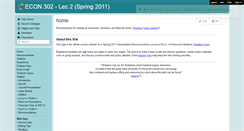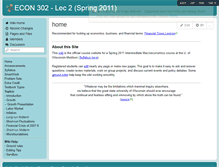ECON 302 - Lec 2 Spring 2011 - home
OVERVIEW
ECON302.WIKISPACES.COM TRAFFIC
Date Range
Date Range
Date Range
LINKS TO WEBSITE
WHAT DOES ECON302.WIKISPACES.COM LOOK LIKE?



ECON302.WIKISPACES.COM SERVER
BROWSER IMAGE

SERVER SOFTWARE
We observed that this domain is employing the nginx operating system.HTML TITLE
ECON 302 - Lec 2 Spring 2011 - homeDESCRIPTION
Skip to main content. ECON 302 - Lec 2 Spring 2011. ECON 302 - Lec 2 Spring 2011. Financial Crisis of 2007-9. Recommended for looking up economics, business, and financial terms Financial Times Lexicon. Is the official course website for a Spring 2011 Intermediate Macroeconomics course at the U. of Wisconsin-Madison Syllabus here. Registered students can edit. Help keep the wiki working smoothly. Whatever may be the limitations which trammel inquiry elsewhere,. Help on how to format text.PARSED CONTENT
The domain econ302.wikispaces.com has the following on the web site, "ECON 302 - Lec 2 Spring 2011." I observed that the webpage also said " ECON 302 - Lec 2 Spring 2011." They also stated " Recommended for looking up economics, business, and financial terms Financial Times Lexicon. Is the official course website for a Spring 2011 Intermediate Macroeconomics course at the U. of Wisconsin-Madison Syllabus here. Help keep the wiki working smoothly. Whatever may be the limitations which trammel inquiry elsewhere,. Help on how to format text."ANALYZE OTHER DOMAINS
A historical survey of the development of economic analysis covering the contributions of mercantalists, physiocrats and classical economists; analysis of the Marxian theory of value and distribution and the theory of production and distribution, the emergence of general equilibrium theory.
What economics is really about! September 19, 2014. US AAA Bond Interest Rates. Compute the average value for each variable for each decade and over the entire period.
This course will cover the major topics in public sector economics. We will examine the issues concerning the provision and allocation of public goods and services from a theoretical perspective, and look into some cases of public provision such as education, social insurance, social security, and health insurance.
Tuesday, April 28, 2009. It disarms criticism, obscures realities, and prejudges results. Why or why not? Are there any causes of poverty besides oppression? Suggestions .